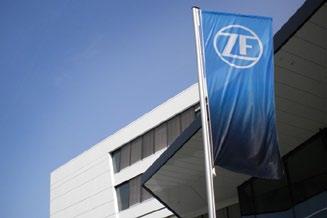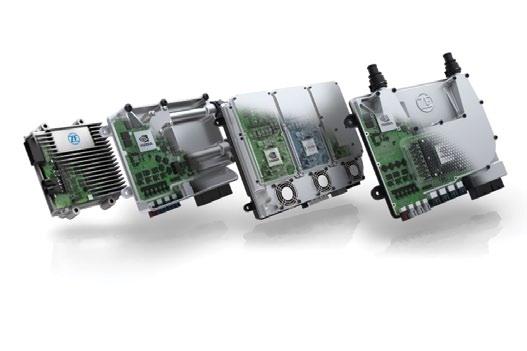
5 minute read
Taking autonomous driving further ZF Group
Taking auTonomous driving furTher
ZF is a German technology company and a specialist in the development of intelligent drive systems for passenger cars and commercial vehicles. The company is at the cutting edge of artificial intelligence research (AI) in digital connectivity, full automation and software, as Philip Yorke reports.

The ZF Group was founded by Ferdinand von Zeppelin in 1915 and began by trading as Zahnradfabrik Friedrichschafen, later abbreviated to ZF. The company has evolved from a supplier specialising in aviation technology to a global technology company focused on research and advanced manufacturing technologies in the automotive and avionics industries. Today ZF continually enhances its systems in digital connectivity automation and sophisticated software that allows vehicles to see, think and act independently.
In 2018, ZF achieved sales of around 40 billion euros. The group has a global workforce of more than 150,000 with 230 facilities located in over 40 countries worldwide. Putting safety and comfort first

Fully automated and autonomous driving are important technologies in helping make the traffic of the future safer, more efficient and more comfortable. Depending on the application, the market demands different solutions. For the time being, intelligent assistance functions, so-called Level 2+ systems, have the greatest potential for passenger cars. In contrast, fully automated systems of level 4 and higher will likely become established in commercial vehicles and urban passenger transport. This is proven by new orders which ZF has received from car and commercial vehicle manufacturer, the company told Industry Europe.

ZF is an attractive partner when it comes to the realisation of automated and autonomous driving in a wide range of applications. CEO Wolf-Henning Scheider explained why at the recent 2020 CES International Trade Fair: “ZF already offers complete systems at different prices and performance levels and is active in all relevant fields of application with passenger cars, commercial vehicles, and industrial technology.”
The company has scaled its broad technology offering to meet virtually any requirement. “With ‘ZF Co-Assist’, we are making a Level 2+ system for the first time, with safety and comfort functions familiar from the luxury classes that can be achieved for inexpensive vehicle segments,” said Scheider.
unlimited potential
Earlier this year, ZF received a major order from a renowned Asian car manufacturer to supply its Co-Assist Level 2+ entry-level system for passenger cars from the end of 2020. ZF’s scope of supply includes system and software development, as well as sensor technology and central electronic control unit. By combining an advanced sensor suite including cameras and radars with a central control unit, functions such as adaptive cruise control, traffic sign recognition, lane change assist, lane keeping assist and traffic jam support are enabled.
“For passenger cars, we see unlimited potential in Level 2+ concepts for implementing automated driving functions and making them accessible to all drivers,” explained Scheider.

Delivering more
The ZF Group is also delivering more in the development of fully automated commercial vehicles. Scheider added: “In the case of commercial vehicles, we are already seeing strong demand for systems that make fully automated driving to Level 4 and higher possible.”
While the use of fully automated passenger cars in public transport still depends on regulations, commercial vehicles can already operate in highly automated modes within closed areas or defined lanes. In addition, driverless transport at depots or in urban passenger transport offers savings potential that leads to a rapid amortisation of system costs.
Based on the ZF ProAI supercomputer, ZF is currently developing the Electronic Control Unit (ECU) for a Level 4 system for an international commercial vehicle manufacturer. The market launch is scheduled for 2024/25.
Futuristic software solutions
ZF is also setting the course for faster and more comprehensive software development: Together with Microsoft, ZF plans to adapt the speed and quality of its processes with futuristic solutions in software engineering orders to enhance the existing level of major IT companies. This change will enable ZF to use its global resources more efficiently and respond more effectively to its customers’ needs. In its cooperation with Microsoft, ZF uses Azure Cloud services and developer tools as well as Microsoft’s experience in agile software development. In the future, ZF will also be a supplier of pure software products in the automotive market.
“The mobility industry continues to undergo major changes. This is the reason why ZF must also continue to change, develop and drive transformation. We have to be able to convince our customers with innovations that offer them – and ultimately the end consumer – added value. And in the future, this will increasingly include software products and services,” commented Scheider.



Advanced dynamic systems
In January this year, ZF won the prestige contract to provide Advanced Drive-System Units (ADU’s) for the new 5 bladed Airbus H145 helicopter. Series delivery begins shortly.
The new version of the Airbus H145 raises the bar concerning performance, maintenance and comfort. The transmission as well as ADU parts, which are used on the new H145, are produced exclusively by ZF and make a significant contribution to setting these new standards.
The H145´s new five-bladed rotor brings a significant increase in useful load, with the maximum take-off weight raised to 3,800 kg and a useful load now equivalent to the aircraft’s empty weight. The simplicity of the new bearingless main rotor design will also ease maintenance operations, further improving the benchmark serviceability and reliability of the H145, while improving ride comfort for both passengers and crew.
For further details of the ZF Group’s latest innovative technologies and intelligent drive systems visit: www.zf.com












